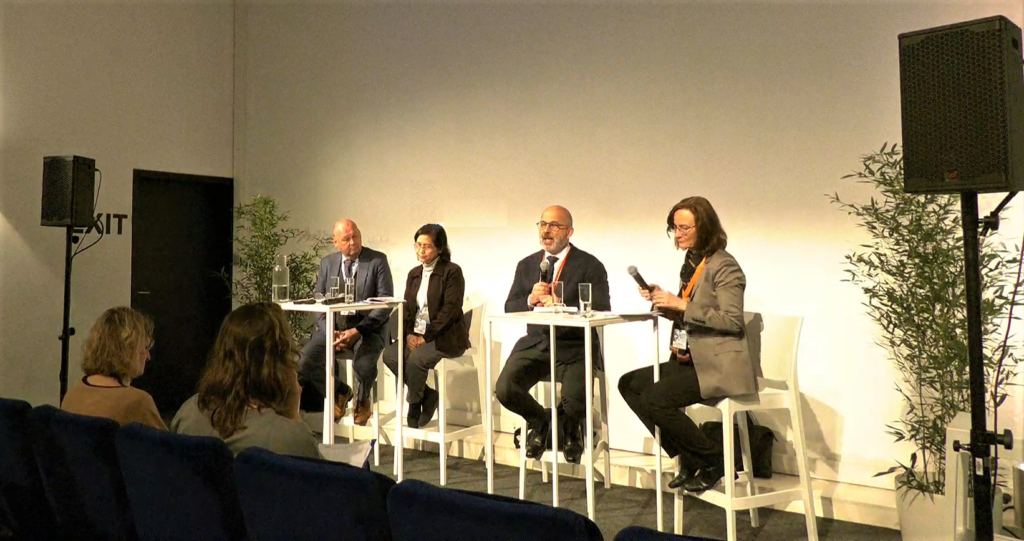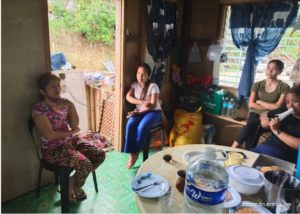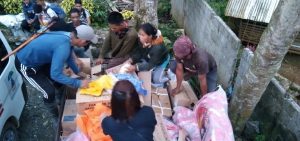
ECOWEB Executive Director Regina S. Antequisa is one of the discussants on the agenda of localization during the three-day global conference on European Humanitarian Forum 2023 (#EHF2023) held at The EGG, Rue Bara 175, 1070 Brussels which started on March 20 to March 21, 2023 hosted by The European Commission and Sweden, in its capacity as President of the Council of the European Union.

Antequisa discussed substantial empirical implementation and advocacy of localization in three major themes:
![]() “Localization: The guidance on the promotion of equal partnerships with local responders” on March 20, 2023.
“Localization: The guidance on the promotion of equal partnerships with local responders” on March 20, 2023.
![]() “From a Humanitarian to a Development-led approach: what is needed to achieve nationally own and locally led solutions to internal displacement?” on March 21, 2023
“From a Humanitarian to a Development-led approach: what is needed to achieve nationally own and locally led solutions to internal displacement?” on March 21, 2023
![]() “Localization – Equitable partnerships in practice” on March 22, 2023.
“Localization – Equitable partnerships in practice” on March 22, 2023.
Antequisa talked on “Localization: The guidance on the promotion of equal partnerships with local responders” along with Juliet Eyokia, Project Manager of Community Empowerment for Rural Development (CEFORD); Michael Koehler, Deputy Director-General of European Civil Protection and Humanitarian Aid Operations (ECHO); Sofia Sprechmann Sineiro, Secretary General of CARE International; and Dominic Crowley, Vice President of Concern Worldwide.

On March 21, 2023, Antequisa delved on the theme “From a Humanitarian to a Development-led approach: what is needed to achieve nationally owned and locally led solutions to internal displacement?” along with Robert Piper, United Nations Secretary General’s Special Adviser on Solutions to Internal Displacement; Auke Lootsma, United Nations Development Programme Resident Representative in Iraq; David Gressly, UN Resident and Humanitarian Coordinator for Yemen; Zahra Abdi Mohamed, Director for Durable Solutions and M&E of the Ministry of Planning, Investment and Economic Development of Somalia.
Antequisa was likewise a panel discussant on March 22, 2023 about “Localization – Equitable Partnerships in Practice” along with Maksym Dotsenko, Director General of Ukrainian Red Cross Society; Nina Stuurman, Regional Emergency and Post Crisis Specialist for Middle East and North Africa of the International Organization for Migration (IOM); Michael Mosselmans, Head of Humanitarian Division of Christian Aid; Joost Monks, Executive Director of Humanitarian Quality Assurance Initiative (HQAI); and Anna Posluszna, Head of Sector of Contracts and Finance of the DG ECHO.

Antequisa advocated on localization inspired by ECOWEB’s humanitarian actions implemented in the Philippines in collaboration with funding partners – focused in war-torn, marginalized, and disaster-affected areas, highlighting the survivors and community-led (sclr) approach which increased affected-community’s participation and accountability in the delivery of humanitarian and development supports based on prioritized needs.
The Directorate-General for European Civil Protection and Humanitarian Aid Operations (ECHO) – part of the organizers of this conference – emphasized focus on “addressing the unprecedented increase of humanitarian needs against unmet funding requirements in order to reduce them, through mobilizing more resources and improving efficiency and effectiveness of humanitarian response.”
The European Humanitarian Forum is considered as an “annual platform to explore and address global humanitarian issues in a wider, cross-sectoral context and jointly bring forward innovative and more sustainable, effective, and efficient solutions.”
There were more than a hundred resource persons in this conference in parallel discussions in varied venues attended by almost 3,000 humanitarian and development stakeholders.

EHF2023 urgent action onward is to mobilize resources, improve performance, and reduce needs; enhance the participation of local and national actors; confirm the importance of transparent and principled prioritization of scarce resources for quality funding; tackle the root drivers to reduce humanitarian needs and mitigate climate-driven disasters; take anticipatory actions and build resilience through adaptation, preparedness, and early warning; enabling safe and efficient humanitarian action in conflict areas by preserving humanitarian space and through diplomacy; and, mainstreaming gender equality and education in emergencies.
These discourses came at the context when the socio-political character of humanitarian crises arises in aggravated complexity of conflicts and natural disasters, hence the call for integrated humanitarian services and actions not only to reduce or mitigate the destruction, distress, and affects to mental health but also the application of humanitarian actions that directly contribute to sustainable development goals, to conflict transformation, peace-building, climate change adaptation, and human rights.

This is observably obliging to the increasing standard and complex frameworks for a people-centered humanitarian action to contribute reduce poverty, strengthen economic stability, increase participative civil institutions, climate change adaptation, protection of the marginalized or vulnerable, and advancing human rights protection. The empirical realities in affected communities in the Philippines affirmed these imperatives too, to address disasters and war-torn regions with efficiency and effectiveness, applying flexible quality funding through approaches and models that will widen the humanitarian resource base in various contexts. It reverberated the inspirations of local actors’ participation in the humanitarian coordination mechanisms including concerns for their safety, thus, the relevance of cross-sectoral approaches when managing new and emerging risks and the adverse effects of climate change.

EU Commissioner Janez Lenarčič pointed out that the disastrous weather frequency and tragic wars continue while there is an evident gap between humanitarian needs and resources.
Lenarčič underscored the values of multilateralism, solidarity for those in need of protection, ambition to help long-term solutions to bring humanitarian aid in a new light, and to ensure that no one in need is left behind.
Lenarčič expressed that the common solutions to global humanitarian challenges, new ideas learned, and exchanged best practices will strengthen commitment to International Humanitarian Law, putting it at the heart of external action and ensuring accountability when people are not properly protected in conflict zones. All with one goal — to help those in need.
Other relevant discussions covered the following concerns:
March 20, 2023
![]() Ensuring the safety and security of humanitarian and medical personnel in armed conflict – Moving from words to action
Ensuring the safety and security of humanitarian and medical personnel in armed conflict – Moving from words to action
![]() Destroying essential services is killing innocent people – can we stop it now?
Destroying essential services is killing innocent people – can we stop it now?
![]() Averting, Minimizing and Addressing Disaster Displacement: Partnerships and Integrated Approaches for Action and Support
Averting, Minimizing and Addressing Disaster Displacement: Partnerships and Integrated Approaches for Action and Support
![]() Humanitarian Leadership in a fractured world
Humanitarian Leadership in a fractured world
![]() How to prevent and respond to sexual violence in conflict settings: Turning IHL commitments into action
How to prevent and respond to sexual violence in conflict settings: Turning IHL commitments into action
![]() From commitments to Action: Inclusion of Persons with Disabilities in Humanitarian Response
From commitments to Action: Inclusion of Persons with Disabilities in Humanitarian Response
![]() Expanding anticipatory action: crises and conflict, diseases outbreaks, food insecurity
Expanding anticipatory action: crises and conflict, diseases outbreaks, food insecurity
![]() Humanitarian Action’ and related key events on anticipatory action such as the ‘Anticipating Food Crises Workshop’, organized by the Global Network Against Food Crises.
Humanitarian Action’ and related key events on anticipatory action such as the ‘Anticipating Food Crises Workshop’, organized by the Global Network Against Food Crises.
![]() Ensuring the safety and security of humanitarian and medical personnel in armed conflict – Moving from words to action
Ensuring the safety and security of humanitarian and medical personnel in armed conflict – Moving from words to action
![]() Destroying essential services is killing innocent people – can we stop it now?
Destroying essential services is killing innocent people – can we stop it now?
![]() Climate change – Averting, Minimizing and Addressing Disaster Displacement: Partnerships and Integrated Approaches for Action and Support
Climate change – Averting, Minimizing and Addressing Disaster Displacement: Partnerships and Integrated Approaches for Action and Support
![]() Uprooted minds: Mental Health and Psychosocial Support in Displacement
Uprooted minds: Mental Health and Psychosocial Support in Displacement
![]() Expanding anticipatory action: crises and conflict, diseases outbreaks, food insecurity
Expanding anticipatory action: crises and conflict, diseases outbreaks, food insecurity
![]() Humanitarian Leadership in a fractured world
Humanitarian Leadership in a fractured world
![]() How to prevent and respond to sexual violence in conflict settings: Turning IHL commitments into action
How to prevent and respond to sexual violence in conflict settings: Turning IHL commitments into action
March 21
![]() Localization of the Humanitarian Response in Ukraine
Localization of the Humanitarian Response in Ukraine
![]() Advancing digitalization in humanitarian settings: the case of health care and employability of refugee youth
Advancing digitalization in humanitarian settings: the case of health care and employability of refugee youth
![]() The unintended negative impact of sanctions and EU restrictive measures – Contemporary challenges for humanitarian organizations
The unintended negative impact of sanctions and EU restrictive measures – Contemporary challenges for humanitarian organizations
![]() From a Humanitarian to a Development-led approach: what is needed to achieve nationally own and locally led solutions to internal displacement?
From a Humanitarian to a Development-led approach: what is needed to achieve nationally own and locally led solutions to internal displacement?
![]() Nexus “Cash” (Efficiency) in Anticipatory Action and Social Protection
Nexus “Cash” (Efficiency) in Anticipatory Action and Social Protection
![]() Shifting the Architecture of Nutrition in Humanitarian Contexts
Shifting the Architecture of Nutrition in Humanitarian Contexts
![]() Better humanitarian responses to sexual and reproductive health and rights in crises
Better humanitarian responses to sexual and reproductive health and rights in crises
![]() Ukraine crisis one year on: What does the data say about humanitarian conditions?
Ukraine crisis one year on: What does the data say about humanitarian conditions?
![]() Addressing the triple nexus and climate security challenge
Addressing the triple nexus and climate security challenge
![]() Starved from Life: Protecting Children from the Effects of Hunger Crises
Starved from Life: Protecting Children from the Effects of Hunger Crises
![]() Bridging the nexus gap: the role of innovative finance in the humanitarian sector
Bridging the nexus gap: the role of innovative finance in the humanitarian sector
![]() Collaboration for expanded refugee outcomes: evidence-based targeting and inclusion
Collaboration for expanded refugee outcomes: evidence-based targeting and inclusion
![]() Climate change – Leave no one behind: rallying forced to direct climate finance to places affected by conflict and fragility
Climate change – Leave no one behind: rallying forced to direct climate finance to places affected by conflict and fragility
![]() Lost in Transition: Lessons from humanitarian-development aid response transition planning in Iraq and Libya
Lost in Transition: Lessons from humanitarian-development aid response transition planning in Iraq and Libya
![]() Next-generation humanitarian partnerships: pushing the agenda on quality funding and localization
Next-generation humanitarian partnerships: pushing the agenda on quality funding and localization
![]() Humanitarian access impediments: the reality of the frontline
Humanitarian access impediments: the reality of the frontline
![]() Managing food crises differently: enhance humanitarian investments in agricultural livelihoods
Managing food crises differently: enhance humanitarian investments in agricultural livelihoods
![]() Gang violence, humanitarian access and protection challenges: the case of Haiti
Gang violence, humanitarian access and protection challenges: the case of Haiti
March 22, 2023
![]() Networking breakfast – partners and DG ECHO management
Networking breakfast – partners and DG ECHO management
![]() Session 1: Minimum Environmental Requirements
Session 1: Minimum Environmental Requirements
![]() Session 2: Quality Funding
Session 2: Quality Funding
![]() Session 3: Localisation – Equitable partnerships in practice
Session 3: Localisation – Equitable partnerships in practice



